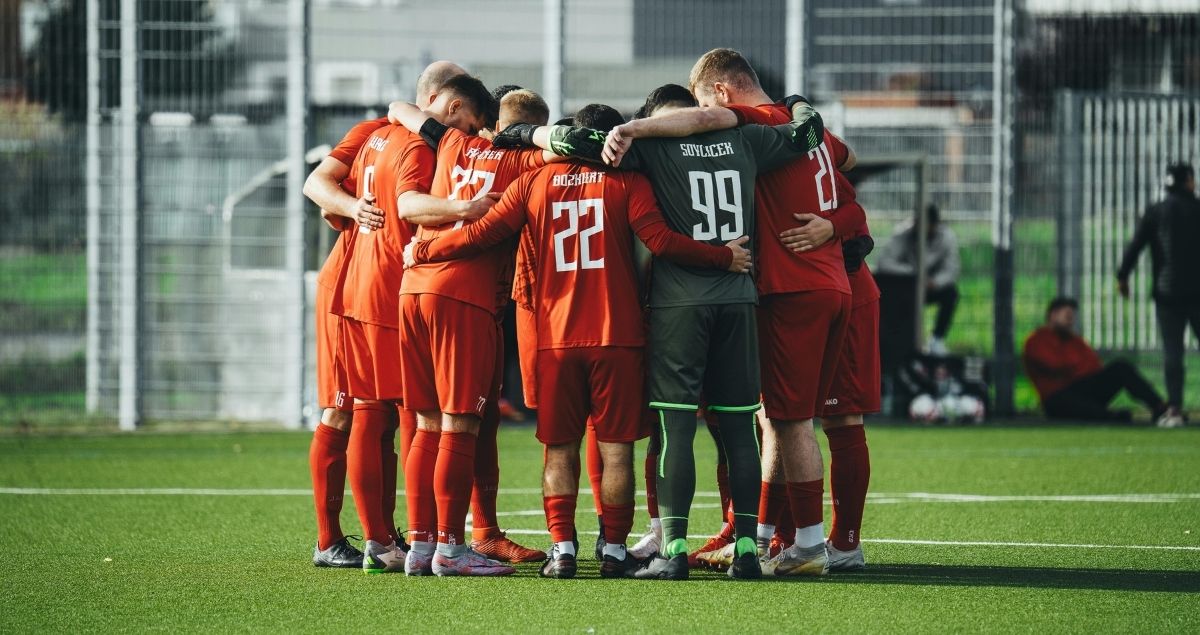Boost your betting experience and get up to $200 bonus right now!
Every grassroots footballer knows the thrill and heartbreak of chasing that perfect match-day moment—the snap of the net, the roar of the crowd, the pulse racing like the final seconds tick away. But here’s the kicker: raw talent and passion alone don’t win trophies or make those jaw-dropping plays stick. It’s the mindset behind the athlete, the iron will to train smarter, think sharper, and push through tougher than anyone else that draws the line between your average Saturday player and the next club legend. In this age of hyper-documented pros with their soccer-dedicated Nike boots and Adidas gear, amateur footballers can learn a thing or two about adopting a pro mentality without sacrificing the love of the game.
Football is as much a chess match as it is a sprint to the ball. The great Andrea Pirlo’s words still echo around training grounds worldwide: “Football is played with your head, your feet are just your tools.” This article unpacks how amateur players can channel the psychology, routines, and resilience of professionals while balancing the realities of suburb pitches, local leagues, and packed day jobs. From building a growth mindset that fuels your hunger to training your brain with positive self-talk and cutting-edge visualization, there’s tactical gold waiting to elevate your play.
Harnessing techniques like meditation, mental rehearsal, and even embracing the flow state can turn chaotic moments into match-winning performances. And yes, gear matters—but more than the latest Puma trainers or that sought-after Mizuno cleat, it’s about equipping your mental game to weather losses, celebrate victories, and rise relentlessly. Discover how embracing discipline in all aspects—from hydration and sleep to reflection and resilience—creates the bedrock for improvement. Unlock pro training tips that take your amateur football journey from scrappy to unstoppable, proving that the mind truly is the gamechanger no coach will ever stop praising.

Sommaire
ToggleBuilding a Growth Mindset for Football: Why It Changes Everything
At the heart of transforming from an enthusiastic amateur to a relentlessly improving player lies the growth mindset—a belief system that your skillset isn’t fixed but can be sculpted with sweat, learning, and hard graft. For footballers, this mentality transcends the pitch and infiltrates daily habits, influencing how one trains, reacts to setbacks, and embraces opportunities. Unlike the fixed mindset which shrinks at criticism or failure, a growth mindset sees every missed shot and lost ball as a stepping stone toward mastery.
Take the example of Jamie, a local striker donning Reebok cleats, who used to give up after a rough game. By adopting a growth mindset, Jamie began viewing missed passes as chances to review technique rather than reasons for self-doubt. This shift not only enhanced his composure but drove him to outwork opponents in training sessions. Coaches value this resilience—they know a player who can bounce back quickly is a player who lasts.
The Pillars of Developing a Growth Mindset in Amateur Football
- Embrace Failure as Feedback: Each mistake provides invaluable information on what to tweak—whether that’s your positioning or reading the opponent’s moves.
- Seek Constructive Criticism: Engaging openly with feedback from coaches or teammates fuels improvement. When Umbro or Kelme kits flood the pitch, it’s the player willing to listen who shines brightest.
- Celebrate Small Wins: Breaking into pro-level play comes from consistent incremental gains—not overnight magic. Applaud token progress on fitness, passing accuracy, or mental clarity.
- Maintain Long-Term Goals: Visualizing your pathway to success keeps focus sharp. Whether it’s excelling in your local league or earning a scouting nod, clarity breeds commitment.
Football fans obsessed with stats might find this rise in mental toughness mirrored in modern analytics. Check out this guide on soccer stats for every fan to see how mental resilience influences key performance metrics. The growth mindset ignites a player’s hunger to keep grinding, making setbacks mere plot twists in the grand story of their career.
Positive Self-Talk: Your Inner Coach on the Field
The power of words isn’t reserved for post-match interviews or locker room speeches; it starts inside your own head. Positive self-talk is the well-oiled mechanism turning nervous energy into match-winning confidence. When your mind constantly feeds self-encouragement—“I can do this,” “I am ready,” or “I’ve trained hard for this”—your body follows suit.
Consider defenders who face relentless attacks wearing New Balance or Mizuno boots. Their ability to block pressure depends as much on skill as it does on combating doubt and quick fatigue with empowering mental affirmations. Negative self-chatter can balloon small mistakes into devastating confidence dives—a downward spiral no player wants near their goalmouth.
Key Strategies for Cultivating Positive Self-Talk
- Identify Negative Patterns: Catch yourself in moments of self-criticism and replace those thoughts consciously.
- Create Personalized Affirmations: Phrase power-boosters relevant to your style and goals like “I am a decisive passer” or “My legs are strong and fast.”
- Use Visual Cues: Attach affirmations to gear or rituals; tying the lighting of new Adidas cleats to a confidence boost ritual is common amongst upcoming players.
- Practice Aloud When Alone: Hearing positive phrases can strengthen their impact, embedding them deeper into your mindset.
In intense moments—whether facing a penalty or orchestrating a counterattack—you can rely on these mental cues to steady nerves. Integrating this tool into warm-ups or halftime pep talks sharpens focus and prediction. To better understand the rituals pro players hold sacred and how mindset intertwines with tradition, explore the fascinating world of football rituals.
Training Your Brain and Body Together: Visualization and Mental Rehearsal
While keeping your legs fit is essential, shaping the mind with visualization and mental rehearsal is the secret staple of elite training. Imagine slipping past defenders, nailing the perfect curve on a free kick, or saving a critical goal—all within your mind before stepping onto the pitch. This technique tricks the brain into believing you’ve already rehearsed action sequences, ramping up muscle memory and reducing performance anxiety.
Top amateur clubs often integrate these mental drills alongside physical sessions, even using branded equipment from Under Armour or Kelme to boost player confidence. For instance, before a big match, goalkeepers visualizing stopping shots can prime their reflexes, leading to tangible improvements in the heat of the game. The mantra is simple: train smart, not just hard.
Practical Steps for Effective Visualization
- Find a Quiet Place: Minimize distractions to focus fully on mental imagery.
- Engage All Senses: Picture the crowd’s roar, the feel of the ball at your feet, and even the sweat on your brow.
- Scenario Practice: Run through both successful and challenging plays mentally to prepare for unpredictability.
- Consistency: Spend 5-10 minutes daily visualizing key match moments and skills.
| Visualized Action | Mental Focus | Benefit |
|---|---|---|
| Dribbling past opponents | Precision and timing | Improves coordination and confidence in one-on-one situations |
| Taking penalty shots | Calmness and accuracy under pressure | Enhances composure during high-stakes moments |
| Defensive positioning | Anticipation and spatial awareness | Reduces risk of being caught out and increases interception success |
To dive further into inspiring profiles of rising stars turning heads in pro circles, check out this spotlight on wonderkids. Training your mental game alongside your physical game is what sets tomorrow’s legends apart even today in 2025.

Recovering Mind and Body: The Discipline Behind the Scenes
Elite footballers don’t just train hard—they recover smarter. Hydrating well, getting enough sleep, eating right, and preventing injury are universally acknowledged pillars, but the professional mindset extends beyond these habits into discipline that sticks regardless of league or fame. It’s about orchestrating every element of life to serve peak performance.
Imagine managing your energy levels as meticulously as your training drills. Nutrition brands like New Balance and Puma endorse recovery nutrition that’s as scientific as the drills they support. Whether it’s managing EMF exposure or respecting natural rhythms via relationship with nature, small tweaks in your routine multiply results on the football pitch.
Routine Discipline for Mind-Body Harmony in Football
- Regular Sleep Schedule: Build consistency and prioritize 7-9 hours to sharpen reaction and reduce injury risk.
- Hydration and Nutrition: Customize intake for training and recovery days focusing on quality proteins, carbs, and healthy fats.
- Active Recovery: Light exercises like stretching, fasciial fitness routines, and gentle walks promote healing.
- Mental Detox: Engage in meditation or mindfulness to clear your mind, lower stress, and enter flow states easier.
For amateurs, blending gear and routine as professionals do—think Reebok compression wear alongside rigorous planning—can seem daunting but creates sturdy footing for long-term success. This mindset goes hand-in-hand with learning from mistakes and self-reflection, techniques that reward every ambitious footballer willing to invest time in personal growth.
Turning Pressure Into Performance: Techniques for Focused Football Minds
The football pitch is a battlefield of nerves, speed, and split-second decision-making. Handling pressure differently can turn matches around, especially in high stakes like cup finals or promotion battles. While some players crack under glare, others harness that energy to sharpen their instincts, awaken creativity, and rise heroically.
Developing reliable mental triggers to reset during chaos, such as quick breathing exercises or focused mantras, is essential to perform when it counts. The latest sports psychology trends as seen with players rocking Joma boots involve blending these tricks into warm-ups and halftime talks to sustain momentum and tactical discipline.
Effective Methods to Control Pressure and Maintain Focus
- Breathing Techniques: Deep, controlled breaths reduce adrenaline spikes and calm the nervous system instantly.
- Mental Triggers: A personal keyword or visual cue that refocuses the mind when distraction or panic arise.
- Process Orientation: Zero in on immediate next actions rather than the result, helping avoid overwhelming pressure.
- Routine Reinforcement: Habitual pre-game rituals create physiological responses that cue calm and readiness.
Because mental toughness intertwines with player flair and grit, the stories of players overcoming huge odds not only inspire but highlight the raw power of a pro mindset. For rich tales celebrating both legends and underdogs who embody this spirit, dive into these football narratives.
| Technique | Description | Benefit |
|---|---|---|
| Deep Breathing | Slow, diaphragmatic breaths focusing on length and control | Reduces stress, lowers heart rate, improves focus |
| Mental Trigger Words | Personalized phrases or images to regain concentration | Quickly resets the mental state during stressful moments |
| Focus on Process | Attention fixed on actionable next moves, not outcomes | Prevents overwhelm and decision paralysis |
| Pre-game Ritual | Consistent routine before games that signals readiness | Triggers calm mindset and equips mental sharpness |
Mastering pressure handling is a journey—it’s about creating space between impulse and action so instinct can rule supreme. With grit, structure, and practice, almost any amateur footballer can become a master of their mind when it counts.
Prepare to unlock your best self in every game by embracing these pro training tips. Build your mental strength with the dedication reserved for your body, and watch your impact on the pitch soar. Ready to train like the stars and gear up with the best from Nike to Joma? It all starts with one clear thought: your mindset is your greatest asset.
Frequently Asked Questions About Developing a Pro Football Mindset
- What is the most important mental skill for amateur footballers?
Developing a growth mindset is key. Believing that skills can improve with effort builds resilience and inspires continuous learning. - How can visualization improve game performance?
Visualization trains the brain by mentally simulating plays and scenarios, enhancing confidence and muscle memory in real matches. - What routines help maintain focus in high-pressure situations?
Breathing exercises, mental trigger words, and focusing on the immediate process rather than results are effective tools. - Why is self-reflection valuable for football players?
Reflecting on your performance and mindset helps identify strengths and weaknesses, guiding purposeful improvements. - Can mental training help prevent injuries?
While mental training can’t replace physical recovery, it promotes discipline and body awareness that aid injury prevention and overall wellness.
Join today and grab up to $200 bonus for your next bets!
Content assisted by AI. This article was created in whole or in part with the help of artificial intelligence.


